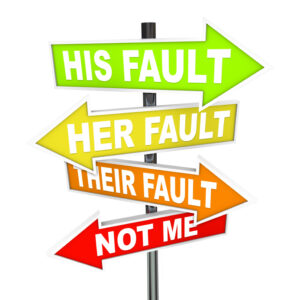How to Cope With Bad Stock Calls Without Self-Destructing

Do you prefer Coke or Pepsi? Steak or chicken? Blaming others or taking all the blame?
The last question pertains to coping strategies—our innate psychological self-defense mechanism to reduce stress in the face of adversity, such as how an analyst would respond after making a bad stock call. Certain coping strategies are important for good mental health and a successful career, while others are counterproductive.
Given the impact coping strategies can have on an analyst’s success or failure, we worked with an industrial psychologist to review these four:
- Accepting responsibility
- Distancing
- Plan-full problem-solving
- Positive reappraisal
Own the Problem, But Not Too Much
In the field of psychology, the coping mechanism classified as “accepting responsibly” is just what you would expect, in that it’s about taking responsibility for one’s outcome or actions (such as succeeding or failing at making a stock call). “Distancing” is a similar coping method used to separate oneself from the outcome. They both occur to diminish the emotional response from the stress event. Based on my experience, analysts who accept responsibility and avoid too much distancing are more likely to learn from their mistakes, which in turn improves their stock picking performance.
By utilizing the optimal coping strategies, you’ll have a built-in quality control system that continually improves your stock picking skills
Some analysts may not realize they’re shirking responsibility by blaming others for bad stock calls, which is an example of these coping mechanisms to reduce stress, but unfortunately, the analyst never takes ownership of the calls. You know you or a colleague aren’t accepting responsibility or are distancing if the primary blame is placed on the information source or another analyst (such as the sell-side being blamed as the problem by their buy-side client). Yes, the source may have been wrong, but it’s the analyst’s job to validate the accuracy of the information. Otherwise, portfolio managers and sell-side clients would just ask third-party information sources for insights.
While owning up to a missed call is important, accepting too much responsibility or not distancing enough can also be problematic because it can cause an analyst to become reluctant to make future stock calls over anxiety from prior bad stock calls (“paralysis of analysis”). In the book Seeing What Others Don’t: The Remarkable Ways We Gain Insights, the author Gary Klein notes “When we put too much energy into eliminating mistakes, we’re less likely to gain insights. Having insights is a different matter from preventing mistakes.”
Here are tips to ensure you’re not falling into either end of the spectrum for these two coping strategies. For key assumptions in your high profile stock calls:
- Spend enough time to develop a unique insight, but budget the amount of time in advance in order to avoid paralysis of analysis
- Validate with more than one source of information, but not so many that time passes and the market ultimately obtains the same information
- Take responsibility if the assumption turns out to be wrong, but don’t dwell on it beyond learning from your mistake (stressing about it in the future won’t undo the bad call)
Work the Problem
“Plan-full problem solving” is a coping method that uses cognitive strategies such as information gathering in an effort to reduce the stress from an event (e.g. “work the problem”). If you find you dig deeper when things aren’t going your way, you are using this strategy. Similarly, “positive reappraisal” is a coping method, classified by psychologists, that is used to re-frame the situation, often as a challenge, such as a bad stock call re-framed as an opportunity to improve one’s analysis.
Based on my observations, analysts who use plan-full problem solving and positive reappraisal as coping strategies have an inherent quality control mechanism that forces them to conduct even better research when stock calls go bad.
To ensure you’re using the right coping strategies in these areas when a stock call is going the wrong way, ask yourself, “What can I do to further research my key assumption(s) more thoroughly?” (don’t just hope things play out as you had hoped). If the call eventually goes bad, ask yourself, “What can I do in the future to avoid a similar bad call?” or, “What should I have done differently?”
Conclusion
Ralph Waldo Emerson put it well when he said, “The greatest glory in living lies not in never falling, but in rising every time we fall.” So how do you rise after a bad stock call? Hopefully, you’re using the best coping strategies that re-calibrate your skills to make you an even better stock picker in the future.
If you’re curious to know more about your coping strategy, we provide feedback with our GAMMA PI™ self-assessment, which includes a dozen questions on this all-important individual characteristic.
This Best Practices Bulletin™ covers activities #3. Making Accurate Stock Recommendations and #7. Individual Characteristics of our GAMMA PI™ framework.
Visit our Resource Center to find more helpful articles, reference cards, and advice towards your growth as an Equity Research Analyst.
©AnalystSolutions LLP All rights reserved. James J. Valentine, CFA is author of Best Practices for Equity Research Analysts, founder of AnalystSolutions and was a top-ranked equity research analyst for ten consecutive years
